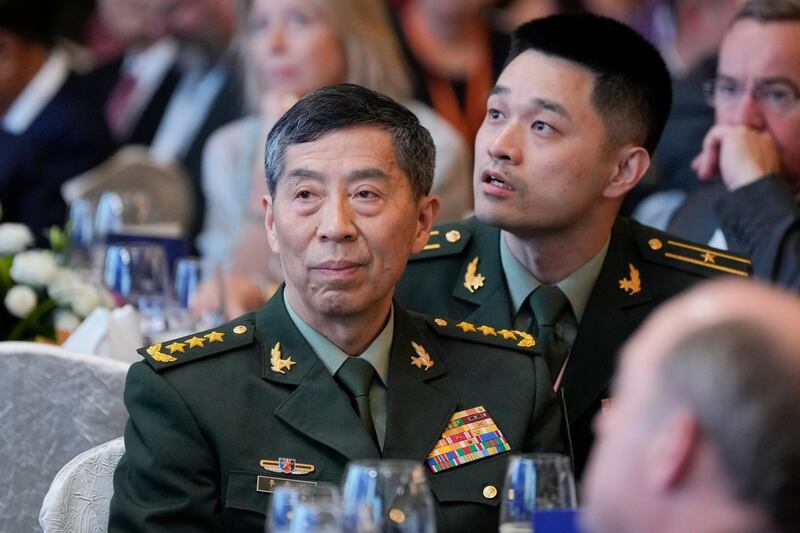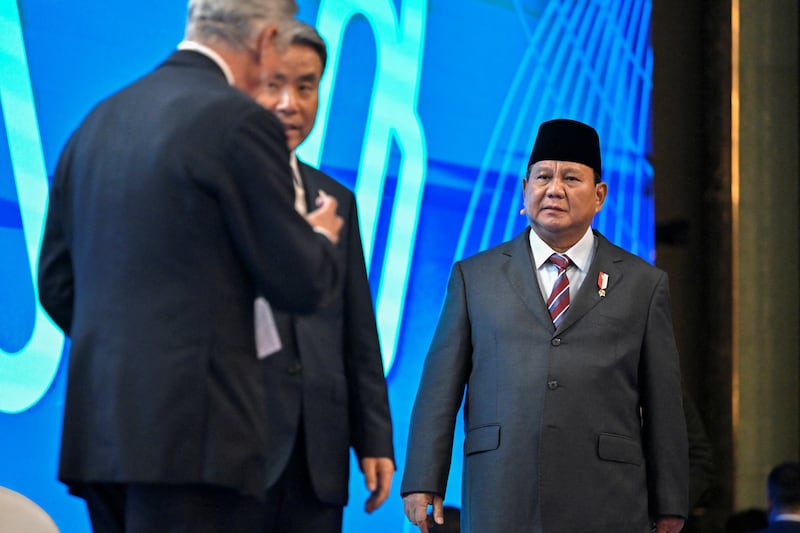Updated at 12:33 p.m. ET on 2023-06-11
U.S. Secretary of Defense Lloyd Austin urged China’s military leaders on Saturday to engage in dialogue to reduce tensions, saying open lines of communication were “essential” after Beijing rebuffed his call to meet with his Chinese counterpart.
In a key address to the Shangri-La Dialogue security forum in Singapore, Austin said he was “deeply concerned” about China being “unwilling to engage more seriously on better mechanisms for crisis management between our two militaries.”
“For responsible defense leaders, the right time to talk is anytime, the right time to talk is everytime and the right time to talk is now,” he said, adding “dialogue is not a reward. It is a necessity.”
“And the more that we talk, the more that we can avoid the misunderstandings and miscalculations that could lead to crisis or conflict.”
The Pentagon chief and Chinese Minister of National Defense Li Shangfu, who has been under U.S. sanctions since 2018, shook hands before an official dinner at the Shangri-La forum on Friday. They did not speak to each other, nor was a bilateral meeting between them anticipated.
“A cordial handshake over dinner is no substitute for a substantive engagement,” Austin said.
The U.S. defense secretary slammed China which, he said, “continues to conduct an alarming number of risky intercepts of U.S. and allied aircraft flying lawfully in international airspace.”
Last week, the U.S. military accused a Chinese fighter jet of performing an "unnecessarily aggressive" maneuver during the intercept of a U.S. Air Force reconnaissance plane.
Beijing responded by calling it a hyped-up accusation, saying the U.S. aircraft had intruded into the Chinese army’s training zone in the South China Sea and its “aerial forces … professionally dealt with the situation in accordance with law and regulation.”
The obvious rift between the two superpowers has “become the new reality,” said Huong Le Thu, a non-resident fellow at the Center for Strategic and International Studies (CSIS).
Regional countries have to accept it whether “they like it or not,” she told Radio Free Asia, a news service affiliated with BenarNews.
“But they can contribute to managing the tensions by lowering the heat through facilitating and encouraging dialogues between the U.S. and China,” the analyst added.

Hours after Austin gave his speech, the U.S. State Department announced that Daniel J. Kritenbrink, the assistant secretary of state for East Asian and Pacific Affairs, was going with a senior White House official to China to “discuss key issues in the bilateral relationship.”
Sarah Beran, senior director for China and Taiwan Affairs at the National Security Council, was to join Kritenbrink for the talks in Beijing, the State Department said in a statement released on Saturday morning (Washington time). Kritenbrink will be traveling to China and New Zealand, from June 4 through June 10, the statement said.
In his speech at the Singapore conference, Carlito Galvez Jr., the Philippines’ acting defense secretary, said Manila saw international law as “the greatest equalizer among states.”
The Philippines won a legal case against China’s claims in the South China Sea before a U.N. tribunal in 2016 but Beijing has so far refused to accept the ruling.
The two countries have recently been embroiled in a new spat over their sovereignty in some of the islands in the Spratly archipelago.
“As the old adage goes, good fences make good neighbors,” Galvez said.
“It is only when neighbors have clear boundaries and respect for set boundaries that relations remain genuinely amicable.”
Indonesian Defense Minister Prabowo Subianto told the forum it was “imperative for us to overcome our geopolitical rivalries, our territorial disputes through dialogues, negotiations and win-win solutions.”
“Compromise is the only way that communities and societies can prosper,” he said, warning that the rivalry between superpowers “has turned into a Cold War” and in any war, “the danger of a catastrophe is always near.”
During his speech, however, Austin insisted that his country “does not seek a new Cold War.”
“Competition must never spill over into conflict. And the region should never be split into hostile blocs,” he said.
Austin said Washington was not creating nor willing to create a new NATO in the Asia-Pacific as China has repeatedly alleged.
Yet the U.S. wishes to build “nimble coalitions to advance our shared vision” in order to make the Indo-Pacific “more stable and more resilient,” Austin said.
Washington lists Australia, Japan, the Republic of Korea, the Philippines, and Thailand as its “staunch allies” in the region and sees India, Indonesia, Vietnam, and Singapore as “valued partners.”
Earlier this year, Washington and Manila agreed to widen a military pact by which the Philippines is giving U.S. military forces access to four bases on its soil that face the South China Sea or are closer to Taiwan, where Sino-American tensions have been brewing.
Speaking about self-ruled Taiwan, Austin said his country “remains deeply committed to preserving the status quo there, consistent with our longstanding one-China policy, and with fulfilling our well-established obligations under the Taiwan Relations Act.”
“Conflict is neither imminent nor inevitable. Deterrence is strong today, and it’s our job to keep it that way,” the secretary stated.
“We do not seek conflict or confrontation, but we will not flinch in the face of bullying or coercion,” Austin also said.

Beijing considers Taiwan a Chinese province and resolutely protests against any involvement by “external forces” in the island’s politics.
Lt. Gen. Jing Jianfeng, deputy chief of the Central Military Commission’s Joint Staff Department, hit back at Lloyd Austin’s remarks about Taiwan, saying it was “completely wrong.”
“There’s only one China in the world, and Taiwan is a sacred and inalienable part of Chinese territory,” Jing said, adding that “it is the common aspiration and sacred responsibility of all Chinese people, including our Taiwan compatriots, to complete the reunification of the motherland.”
A researcher at People’s Liberation Army (PLA) Academy of Military Sciences, Senior Col. Zhao Xiaozhuo, said that it is the U.S. which has been trying to change the status quo in the Taiwan Strait.
“The Taiwan Strait was pretty stable in the last ten years or so but the U.S. wants to destroy this stability,” Zhao told reporters at the Shangri-La Dialogue.
“That way they can sell weapons to Taiwan and make a lot of money,” he said.
Chinese participants at the security forum in Singapore have taken a proactive approach in countering criticism from the U.S. and its allies.
Senior Col. Zhao said Washington needed to change what he called “erroneous actions” in the way it interacts with others.
“When it comes to dialogue you have to take care of the opposite party’s interests,” he said, accusing the U.S. side of not understanding this basic principle.
Another Chinese delegate, Senior Col. Zhang Chi, from the National Security College at China’s National Defense University, questioned whether Washington had contradicted itself by establishing multilateral institutions while promoting the centrality of ASEAN, the Southeast Asian bloc.
Meanwhile, Maj. Gen. Tang Yongshen, former deputy commandant of the same college, hit back at Canadian Defense Minister Anita Anand for calling China a disruptive force in the region.
“China has made great efforts to maintain peace and stability in the region,” Tang said.
“In fact, what you said is disruptive,” he added bluntly.
This report was produced by Radio Free Asia. It has been updated to include details about the announcement of a visit to Beijing by senior U.S. officials.
